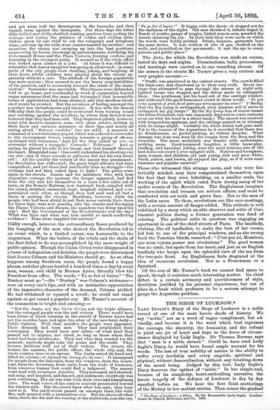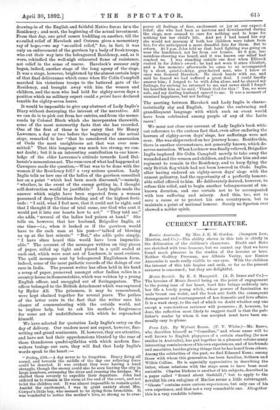THE SIEGE OF LUOKNOW.*
LADY Ixoms's Diary of the Siege of Lucknow is a noble record of one of the most heroic deeds of history. We say "noble," not as a word of vague compliment, but ad- visedly, and because it is the word which best expresses the courage, the sincerity, the humanity, and the refusal to yield one jot of heart and hope to the force of circum- stance displayed by Lady Inglis. Sir Thomas Browne says that " man is a noble animal." Could he have read Lady Inglis's Diary, he would have found ample warrant for his words. The test of true nobility of nature is the ability to suffer every hardship and every anguish, spiritual and physical, without demoralisation, without any breaking-down of the moral being. Judged by this test, Lady Inglis's Diary deserves the epithet of "noble." In her simple and, because of its simplicity, heart-enthralling narrative, the heroic tragedy of the defence of Lucknow is day by day unrolled before us. We hear the first faint mutterings of the Mutiny in her earliest entries. Then comes the gradual • The Siege of Lucknow : a Diary. By the Honourable Lady Inglis. London: James R. Osgood, Mellvaine, and Co. 1822.
drawing-in of the English and faithful Native forces in'o the Residency; and next, the beginning of the actual investment.
From that day, one grief comes huddling on another, till the to-called relief of Havelock and Gramm gives a momentary ray of hope,—we say "so-called relief," for, in fact, it was only an enforcement of the garrison by a body of fresh troops, who cut their way into the beleaguered Residency, and, as it were, rekindled the well-nigh exhausted flame of resistance, not relief in the sense of rescue. Havelock's succour only began, indeed, another stage of the long agony of the siege. It was a stage, however, brightened by the almost certain hope of that final deliverance which came when Sir Colin Campbell marched his victorious troops to the battered gate of the Residency, and brought away with him the women and children, and the men who had held for eighty-seven days a
position which no military expert could a priori have declared tenable for eighty-seven hours.
It would be impossible to give any abstract of Lady Inglis's Diary without destroying the interest of the narrative. All we can do is to pick out from her entries, and from the memo- randa by Colonel Birch which she incorporates therewith, some of the most noteworthy facts that she has recorded. One of the first of these is her entry that Sir Henry Lawrence, a day or two before the beginning of the actual siege, remarked to her "that he considered the annexation of Oude the most unrighteous act that was ever com- mitted." That this language was much too strong, we can- not doubt ; but it is an interesting contribution to our know- ledge of the elder Lawrence's attitude towards Lord Dal- housie's momentous act. The rumours of what had happened at Cawnpore made the question,—What was to be done with the women if the Residency fell? a very serious question. Lady Inglis tells us how one of the ladies of the garrison consulted her on a point " which bad been much discussed,"—namely, "whether, in the event of the enemy getting in, I thought self-destruction would be justifiable." Lady Inglis made the answer which might have been expected from a woman possessed of deep Christian feeling and of the highest forti- tude: "I said, what I feel now, that it could not be right, and that I thought if the time of trial came, our God who sent it would put it into our hearts how to act." " They told me," she adds, "several of the ladies had poison at hand." She tells us, however, that her husband, Brigadier Inglis, at one time—i.e., when it looked as if the garrison would have to die each man at his post—" talked of blowing us up at the last minute." " But," she adds quite simply, " I have since heard this would have been impractic- able." The account of the messages written on tiny pieces of paper, rolled up tight and placed in a quill sealed at each end, which were sent out of Lucknow, is most curious.
The quill messages sent by beleaguered Englishmen form, indeed, some of the most pathetic records of the doings of our race in India. The present writer has often held in his hand
a scrap of paper, preserved amongst other Indian relics in a country-house in Somersetshire, which was written by a young English officer, and smuggled out of Seringapatam. The
officer belonged to the British detachment which was captured by Ryder Ali. The prisoners, it may be remembered, were kept chained together for several years. The pathos of the letter rests in the fact that the writer uses his chance of communicating with the outside world, not to implore help, but to ask his mother's forgiveness for some act of undutifulness with which he reproached himself.
• We have selected for quotation Lady Inglis's entry on the day of delivery. Our readers must not expect, however, fine- writing and grand sentiments. If, however, they are attentive, and have not had their apprehensions blunted by the roar of those thunderous quadri-syllables with which modern fine- writers besiege our ears, they will find that Lady Inglis's words speak to the heart :—
" Friday, 251h.—A day never to be forgotten. Heavy firing all round, and towards the middle of the day our. relieving force could be descried. It was evident they were having a hard struggle, though the enemy could also be seen leaving the city in large numbers, swimming the river and crossing the bridges. We shelled them severely to expedite their departure. John had ordered us to remain in the room at the end of the court, and not to let the children out. It was-almost impossible to remain quiet. Amidst the excitement, I was in great anxiety about Mrs. Cowper's little boy, who seemed to be dying from bronchitis. It was wonderful to notice the mother's love, so strong as to over- power all feelings of fear, excitement or joy at our expected relief ; she who had been so nervous and downhearted during the siege, now seemed to care for nothing and to hope for nothing but her child's life. And yet I had heard her say she would not murmur if both her children were taken from her, for she anticipated a more dreadful fate for them. But to return. At 3 p.m. John told us that hard fighting was going on near the bandstand, not far from our houses. At 6 p.m. tre- mendous cheering was heard, and it was known our relief had reached us. I was standing outside our door when Ellicock rushed in for John's sword ; he had not worn it since Chinhut, and a few moments afterwards he came to us accompanied by a short, quiet-looking, gray-haired man, who I knew at once was General Havelock. He shook hands with me, and said he feared we had suffered a great deal. I could hardly answer him ; I longed to be with John alone, and he shared my feelings, for erelong he returned to me, and never shall I forget his heartfelt kiss as he said, Thank God for this Yes, we were safe, and my darling husband spared to me. It was a moment of unmixed happiness, but not lasting."
The meeting between Havelock and Lady Inglis is charac- teristically shy and English. Imagine the embracing and grandiloquent language with which such an event would have been celebrated among people of any of the Latin races !
We must not close our account of Lady Inglis's book with- out reference to the curious fact that, even after enduring the horrors of eighty-seven days' siege, her sufferings were not over. She was shipwrecked on her journey home. Besides this, there is another circumstance, not generally known, which de- serves narration. When Lucknow was finally relieved, Brigadier Inglis implored Sir Colin Campbell merely to take away the wounded and the women and children, and to allow him and one regiment to remain in the Residency, and to keep flying the only British flag which had not been lowered in Oude. Inglis, after having endured an eighty-seven days' siege with the utmost gallantry, had the opportunity of a perfectly honour- able relief offered to him. He deliberately desired, however, to refuse this relief, and to begin another beleaguerment of un-
known duration, and one certain not to be accompanied with less suffering and misery. And this, too, not to save a cause or to protect his own countrymen, but to
maintain a point of national honour. Surely no Spartan ever showed a nobler spirit.



















































 Previous page
Previous page